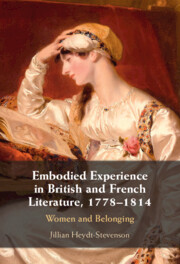Embodied Experience in British and French Literature, 1778–1814
Combining feminist, materialist, and comparatist approaches, this study examines how French and British women writers working at a transformative time for European literature connected vibrantly to objects as diverse as statues, monuments, diamonds, and hats. In such connections, they manifested their own (often forbidden) embodiment and asserted their élan vital. Interweaving texts by Edgeworth, Staël, Bernardin, Wordsworth, Smith, and Burney, Jillian Heydt-Stevenson posits the concept of belonging with, a generative, embodied experience of the nonhuman that foregrounds the interdependence among things, women, social systems, and justice. Exploring the benefits such embodied experiences offer, this book uncovers an ethical materialism in literature and illuminates how women characters who draw on things can secure rights that laws neither stipulate nor safeguard. In doing so, they – and their texts – transcend dualistic thinking to create positive ecological, personal, and political outcomes. This title is also available as Open Access on Cambridge Core.
Jillian Heydt-Stevenson, Professor of English at the University of Colorado Boulder, is the author of Austen’s Unbecoming Conjunctions (2005), coeditor of Recognizing the Romantic Novel (2008), associate editor of The Cornell Wordsworth: Last Poems, 1821–1850 (1999), and author of a wide variety of articles and chapters on Romantic-era topics and writers.

